
Stop Suffering
From Sleep Apnea
Fill Out the Form to Schedule Your
Consultation
We accept most insurance!



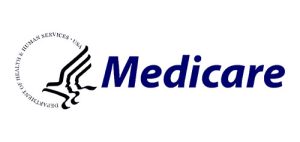
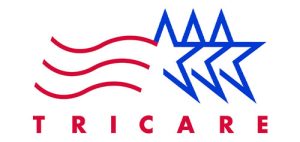











Sleep Apnea - Treating the Cause,
Not Masking the Symptoms
Sleep apnea is a condition occurring when you fall asleep and have repeated interruptions of breath. More than 18 million people in the United States have sleep apnea, many of whom have not been diagnosed. When people with sleep apnea don't receive treatment, it can lead to several daily issues like headaches, fatigue, and poor memory. If you suspect that you may have sleep apnea, it's important to see a medical professional. They will be able to assess your symptoms and make recommendations for treatment.
Over time, sleep apnea can develop into a more severe condition that affects your health in a variety of ways. In the short term, you may find yourself feeling irritable and tired, but over time it can lead to conditions such as diabetes, high blood pressure, and stroke. Dr. Connor is a highly accredited expert in the field of Dental Sleep Medicine and has been helping people just like you in treating the root cause of Sleep Apnea leading to remedies for this condition and reducing the risk of developing life-threatening health issues related to Sleep Apnea.
Here on the sleep apnea page, we provide links to more information about sleep apnea and what you can do to get treatment with Dr. Connor at our practice.
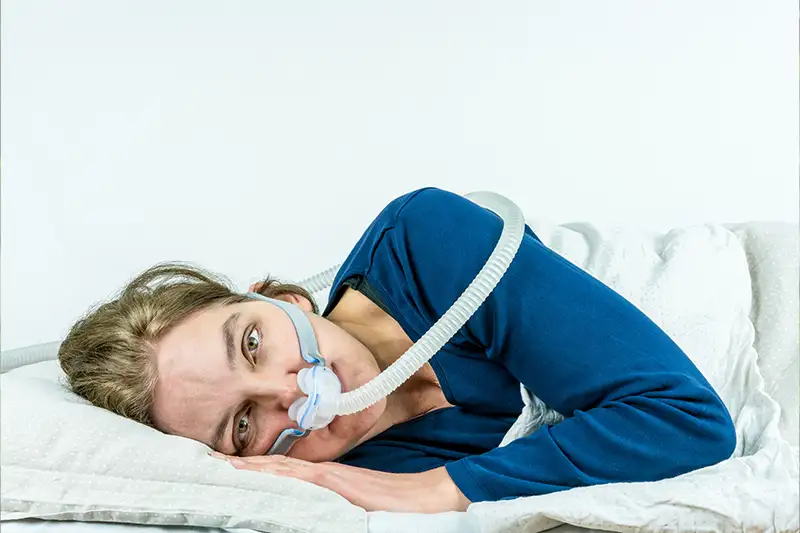
3 Types of Sleep Apnea
There are three main types of sleep apnea:
- Obstructive Sleep Apnea: OSA is the most common type of Sleep Apnea and it occurs when the airway has been blocked, like when your throat muscles are relaxed.
- Central Sleep Apnea: When Central Sleep Apnea is present, there are neurological malfunctions and the brain can't tell the muscles in your throat to breathe.
- Mixed Sleep Apnea: Mixed, or Complicated, Sleep Apnea is a combination of Central and Obstructive Sleep Apnea.
The best way to address sleep apnea will vary depending on which type of sleep apnea you have. You can learn about the next steps for your condition by having a sleep study, after which Dr. Connor will determine which type of Sleep Apnea you have and the best way to treat it.
Main Causes of Sleep Apnea
OBSTRUCTIVE SLEEP APNEA is caused by the muscles and soft tissues in the throat, mouth, or nose relaxing to the point of narrowing the breathing passages. As the space in the airway is reduced, breathing becomes more difficult and can be accompanied by coughing or wheezing. When this happens, the tissues at the back of your throat may vibrate with every breath. The vibrations we associate with snoring come from the sound that is produced when a person breathes while they sleep, Snoring often indicates breathing issues during sleep. Experts say that those who do it may not get enough oxygen at night. Individuals who suffer from sleep apnea often have difficulty breathing and may experience 10-second pauses in their breaths, which can lead to very loud snoring.
Sleep apnea prevents people from breathing properly and limits the amount of oxygen to their brain. If you have even the slightest suspicion that you may have this condition, it is important to seek out treatment immediately.
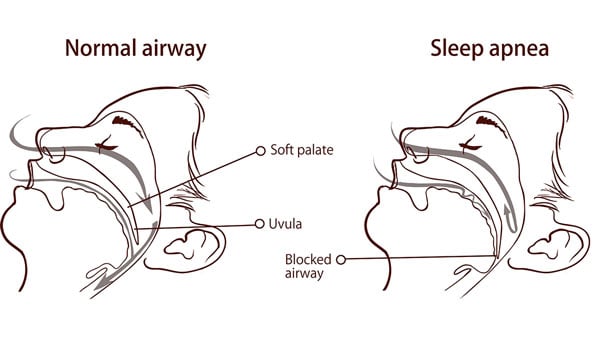
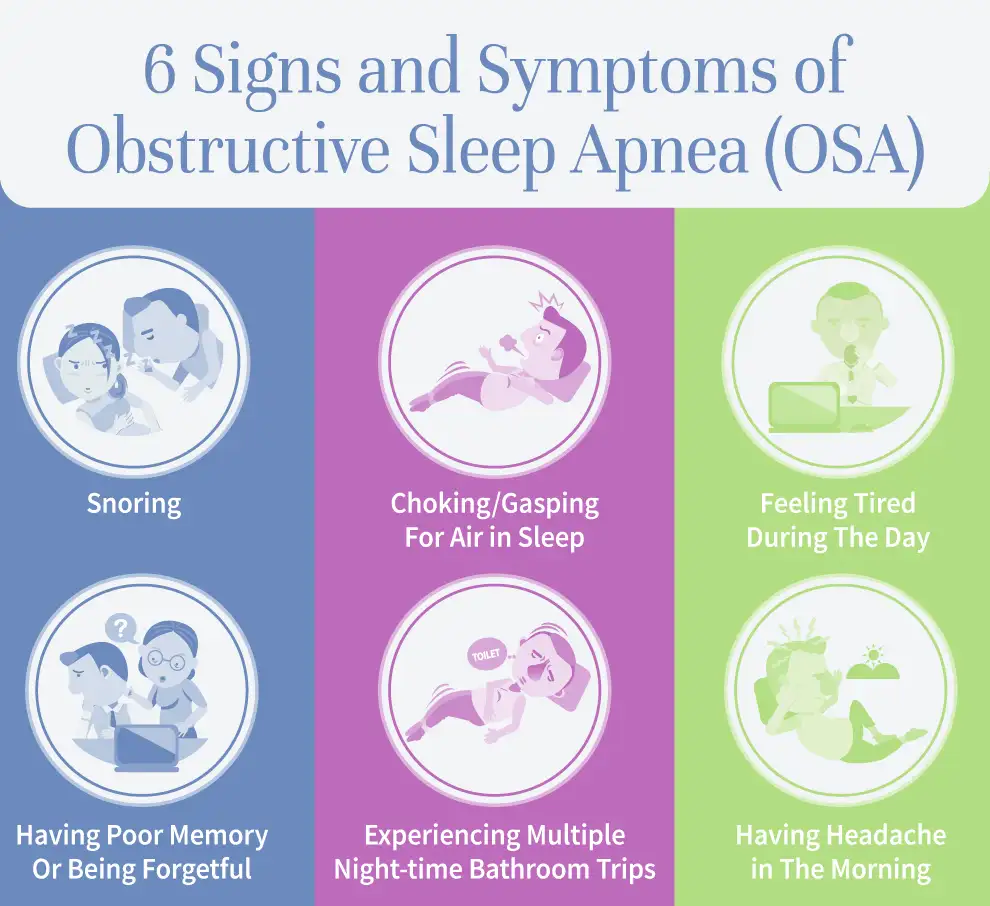
Sleep Apnea Symptoms and Signs
If you have obstructive sleep apnea, then someone close to you may notice your symptoms first. This is because the symptoms are more noticeable to those close to the person who will eventually be diagnosed. These are some of the tell-tale signs that a person may have sleep apnea:
- Snoring.
- Choking/Gasping for Air in Sleep.
- Feeling Tired During the Day
- Having Poor Memory Or Being Forgetful.
- Experiencing Multiple Night-time Bathroom Trips
- Having Headaches in the Morning.
These symptoms often occur because the individual is unable to breathe properly as they sleep - this can have an effect on the quality of their sleep. As a result, people tend to feel especially sleepy throughout the day and may have issues staying awake.
Do I Have Obstructive Sleep Apnea (OSA)?
The most common type of sleep apnea is OSA, and, oftentimes, it goes unnoticed because the primary cause (snoring) only manifests at night. This means that a person cannot diagnose themselves if they have OSA. This can also lead to serious health risks where sleep apnea is concerned. The interruptions in breathing during the night are likely to lead to daytime symptoms that affect the heart and blood pressure and consequently be hazardous. If you're experiencing these symptoms or something else that points to sleep apnea, Dr. Connor can help by way of consultation, However, this checklist can help you gain a more thorough understanding of whether your symptoms may be an indication of OSA:
- I snore – Since snoring is typically the result of a partially blocked airway, it can be a telltale sign of extra-relaxation in tissue in your throat which may be a symptom of OSA. It is estimated that around one-third of people who snore may also be affected by obstructive sleep apnea.
- I breathe through my mouth – Mouth breathing eliminates your ability to filter out pollutants, allergens, pesticides, smog, pollen, and other microbes when breathing, often causing swelling and inflammation of the throat that can restrict the airways.
- I feel tired and have no energy during the day – Those of us with obstructive sleep apnea often struggle with daytime sleepiness because the symptoms of ‘not enough deep sleep’ cause weakness and lack of concentration.
- I have a chronic cough, sore throat, or difficulty swallowing – Throat issues often come with OSA and other mouth-related problems. Conditions like GERD and sleep apnea often occur together. A dry mouth and sore throat in the morning are often signs that you’re breathing through your mouth for prolonged periods of time. This is considered to be a dysfunctional form of breathing, which may inflame the tissues in your throat.
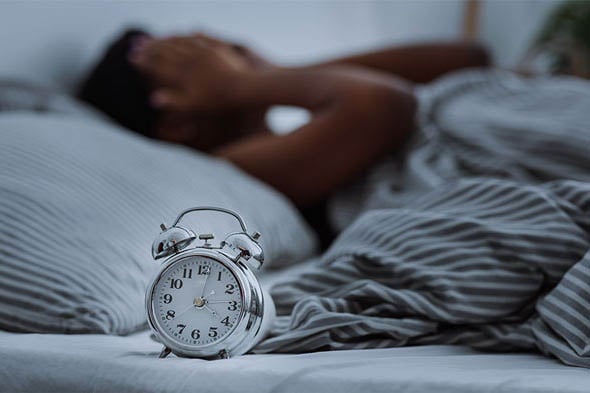
The ten-second respite on your breath when you're asleep could be enough to activate the "fight or flight" response which can be marked by an alert from the Sympathetic Nervous System, releasing cortisol. These increased cortisol levels can lead to repercussions in your health, like elevated blood pressure and cardiac arrhythmia. If this disorder isn't treated, it could potentially be life-threatening. For these reasons, it is crucial to diagnose your symptoms quickly and get the right treatment.
The Risks of Sleep Apnea
Untreated sleep apnea can lead to a range of negative health outcomes, including but not limited to high blood pressure, stroke, depression, and cognitive impairment. People who don't get prompt treatment are at a higher risk of developing the following:
- Loud Snoring
- Snorting or Gasping for Air
- Frequent Nighttime Urination
- Morning Headaches
- Irritability
- Daytime Sleepiness
- Memory Loss
- Lack of Energy
- Drowsy Driving
- Excessive Stress
- Cardiovascular Strain
- Erectile Dysfunction
- Increased Risk for Accidents
- Weight Gain
- Depression
- High Blood Pressure
- Stroke
- Diabetes
- Obesity
- Respiratory Disorders
- Loud Snoring
- Snorting or Gasping for Air
- Frequent Nighttime Urination
- Morning Headaches
- Irritability
- Daytime Sleepiness
- Memory Loss
- Lack of Energy
- Drowsy Driving
- Excessive Stress
- Cardiovascular Strain
- Erectile Dysfunction
- Increased Risk for Accidents
- Weight Gain
- Depression
- High Blood Pressure
- Stroke
- Diabetes
- Obesity
- Respiratory Disorders
- Loud Snoring
- Snorting or Gasping for Air
- Frequent Nighttime Urination
- Morning Headaches
- Irritability
- Daytime Sleepiness
- Memory Loss
- Lack of Energy
- Drowsy Driving
- Excessive Stress
- Cardiovascular Strain
- Erectile Dysfunction
- Increased Risk for Accidents
- Weight Gain
- Depression
- High Blood Pressure
- Stroke
- Diabetes
- Obesity
- Respiratory Disorders
Dr. Connor: The Holistic Breathing
Wellness Movement
Dr. Connor is a part of the holistic breathing wellness movement, which aims to increase awareness and improve treatment for sleep-related airway conditions like sleep apnea. She has partnered with organizations focused on collaborating with dentists to apply the sciences of Craniofacial Epigenetics (the study of cranial modifications caused by gene expression as opposed to genetic code alteration) and Pneumopedics® (the practical application of oral appliance therapy and non-surgical airway remodeling) in the management of sleep apnea. Collectively, the application of these particular sciences allows for the underlying causes of airway blockage to be treated in 98% of cases. This has been seen to provide high success rates among sleep apnea patients.
Dr. Connor delves into every patient’s sleep apnea situation to determine their needs and provide the right treatment options. Based on home sleep test results, dental impressions, CT scan, and images of the patient’s oral cavity. She’s able to find the most effective treatment plan by using our state-of-the-art technology. She has experience dealing with sleep disorders, so she’s able to devise a treatment plan that will work for each specific case. This helps people breathe better during the daytime and overnight as well.


We Treat The Root Cause
of Sleep Apnea
Sleep apnea can be successfully treated with the help of the proper diagnosis and treatment plan. Talk with Dr. Connor today and reduce your risk of sleep apnea. After you have received a sleep apnea diagnosis, Dr. Connor will talk with you about your symptoms, review your medical history, and may perform a scan utilizing state-of-the-art dental technology to evaluate possible obstructions. Once you give Dr. Connor an overview of your situation, she will create a personalized treatment plan that should resolve these nighttime breathing issues. This often involves the use of a custom-fitted mouthpiece the patient will wear while sleeping, requiring no CPAP, BiPAP, drugs, or surgery.
If a patient’s sleep apnea is being caused by their tongue relaxing in the throat, a tongue-retaining device may be the ideal treatment for keeping their airways open. If you’re experiencing breathing difficulties, Dr. Connor may recommend a mandibular repositioning device - like a mouthpiece or head strap – to help position your jaw in its natural alignment. Oral devices used to fix sleep apnea problems are removable and typically look like athletic mouth-guards and are normally worn at night.
Frequently Asked Questions
About Sleep Apnea
A lot of people may snore at some point in their lives, so it might not always be a sign of sleep apnea. It’s normal to snore every now and then, but if you have been snoring regularly, getting yourself or someone you love evaluated for sleep apnea would be a wise step. Sleep apnea can be associated with serious conditions including stroke, heart attack, and high blood pressure.
Generally, people with sleep apnea are more likely to be males than females and individuals over 40 vs. children and teens. That said, anyone can develop sleep apnea. Some of the biggest factors that contribute to a heightened risk include:
- A family history of sleep apnea and/or snoring
- Excess weight or obesity
- Large tonsils
- A thick neck
- A small lower jaw
- Narrow airways
- Alcohol consumption before bed
- Frequent nasal congestion
- Post-menopause
- Low thyroid levels
If any of these high-risk factors apply to you and signs of sleep apnea are present, Dr. Connor is happy to talk about the likelihood of you (or a loved one) developing the condition. She can get you a diagnosis, as well as make sure you’re getting the best sleep apnea treatment that’s right for your needs.
There are many things that can intensify the effects of sleep apnea, like:
- Weight Gain–Sleeping with extra weight can cause tissues to bulk up, which may lead to a lack of airflow when these tissues get relaxed.
- Sleep Position – If you sleep on your back that can cause the tongue to relax deeper into your mouth/throat, limiting proper airflow.
- Alcohol– Drinking alcohol close to bedtime makes muscles relax more on average, increasing the risk of them obstructing your airway.
- Certain Medications– Like with alcohol, some medicines can cause greater obstruction of the airways due to muscle over-relaxation. A great example would be muscle relaxers and sleeping aids. Sleeping pills can contribute to more severe pauses in breathing by disrupting your sleep cycle and require a significant respiratory event to wake up.
- Diabetes– Poor sleep can worsen symptoms of diabetes and conversely, poor glucose control can make the symptoms of sleep apnea more severe.
- Smoking– Over time, cigarette smoke (among other things) can build up and create an inflammatory response in the mouth and throat. This can lead to a narrowing of the airway as it becomes inflamed.
The diagnosis of sleep apnea can come with a lot of constraints. However, we can help you maintain control or avoid them so that treatment is as successful and easy as possible.
The Apnea Hypopnea Index (AHI) is a valuable tool for diagnosing the severity of sleep apnea. The common apnea-hypopnea index (AHI) is the combined number of pauses in breathing each hour. Typically, a person without these pauses would have an AHI reading of 0. An AHI of 30 or more, meaning 30 or more hypopneas recorded per hour is classified as “severe” sleep apnea. For reference, an AHI of 15–29 is considered “moderate” sleep apnea, and an AHI of 5–14 is deemed “mild” sleep apnea. AHI = apnea-hypopnea index. That being said, even a few pauses of 5 apneas &/or hypopneas per hour can lead to many of the detrimental side effects and medical complications associated with sleep apnea.
When the body doesn’t get enough oxygen, blood is unable to deliver all its essential ingredients. To compensate, the heart pumps harder and adrenaline is released as a natural stress hormone. When this happens regularly, as it does for those with sleep apnea, the cardiovascular system is continually over-taxed and elevated adrenaline levels circulate repeatedly throughout the heart and body. Over time, this combination of cardiovascular strain and elevated adrenaline in the blood can lead to chronic high blood pressure and the progression—or even cause—of heart disease.
Contact Advanced Sleep and TMJ Solutions Today
If you have any questions about sleep apnea or would like to explore treatment options, schedule an appointment by completing the form, or call us at (262) 400-3185 today and, sleep better tomorrow.